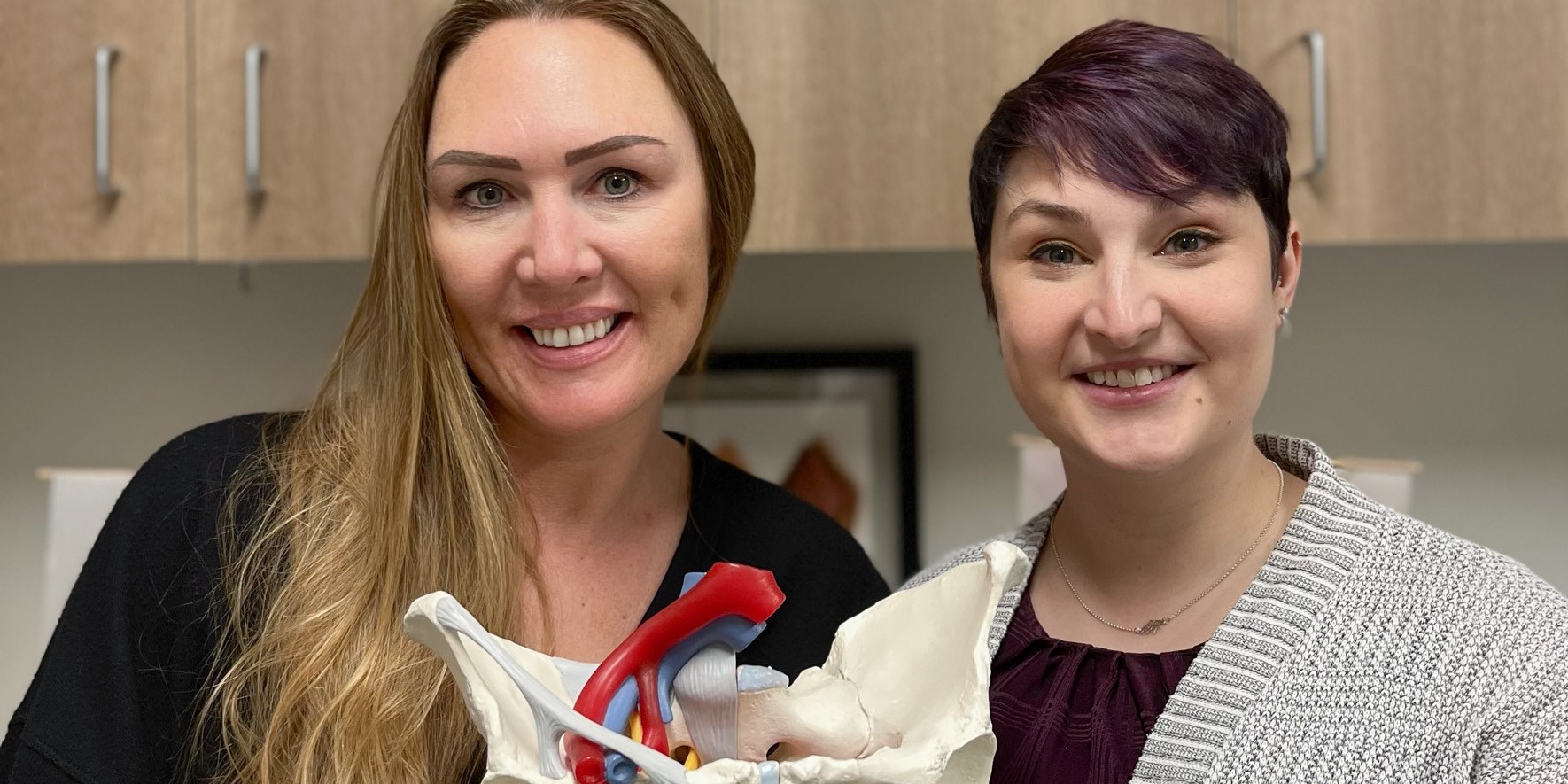
Mora Pluchino is instructing her ethics course, Ethical Considerations from a Legal Lens, which is scheduled for June 3, 2023. This remote course covers ethical considerations from a legal lens for professionals working in the area of Pelvic Health. Health Care Professionals have many day-to-day ethical considerations to “do no harm” including basic decisions for billing, patient care, safety, and compliance. Pelvic Rehabilitation comes with additional layers of vulnerability and ethical challenges, and the legalities of pelvic health can add further complications for patient care, business, and clinical practice decisions.
The patient is a 70 cis-gender female:
- Primary complaints - Painful sitting, terrible tailbone pain x 2 years
- Secondary complaints - SUI, fecal urgency, mild POP
- Prior therapy - multiple, most recent Hospital Based OPPT 3 x per week x 8 weeks (24 visits)
- Progress - minimal to none, the patient actually thinks her symptoms are worsening, pain is unbearable
- Other diagnoses - Parkinson’s Disease, HTN, high cholesterol
- Primary Insurance - Medicare
SEPTEMBER
The patient presents to the provider for specialized pelvic floor therapy. The patient is seen 1 x per week for a total of 6 visits. The patient reports a 75% reduction in symptoms, adheres to her HEP, and attends all scheduled visits.
Treatment Included:
- Internal rectal musculature work (Instructed in Pelvic Floor Level 2A)
- Body mechanics and coccyx mobilization - internal and external (Instructed in Coccydynia & Painful Sitting)
- Sacral nerve release techniques (Instructed in Sacral Nerve Manual Assessment and Treatment)
NOVEMBER
The patient is now able to participate in her ADL, regular exercise routine, and her social life and she has noticed how her endurance and balance have declined as she tries to return to normal. She starts to come in 2 x per week, one day a week focusing on her pelvic floor complaints and one day a week focusing on her endurance, balance, and Parkinson’s symptoms. She completes an additional round of therapy 2x per week for 8 weeks. She progresses slowly but objectively measures small therapy gains.
Additional treatment:
- General strength and endurance training and conditioning
- Large amplitude movement program
- Education for a home walking program
- Connection to a Parkinson’s boxing program in the community
FEBRUARY
The patient gets sick, misses 2 weeks of therapy, and has a return in her coccyx pain and an exacerbation of her Parkinson’s symptoms. Her tremors became so bad that she has to cancel multiple sessions at the last minute. She is now also having swallowing and speech problems. She finally gets in with her neurologist who explains her Parkinson’s has progressed. They recommend changing her medications, assessment for a brain stimulator, and trying an intensive LSVT BIG Program 4x per week for 4 weeks.
Please pause and take a moment to think about a few things that may pop up for a provider from an ethical or legal lens!
SOME ETHICAL + LEGAL CONSIDERATIONS FOR THE CASE
- Prior to beginning the LSVT BIG program, the patient is already at 46 visits in total
- Your practice is a small, niche market practice that specializes in Pelvic Health - this patient only ended up with you due to her tailbone pain - your location is small and does not have “big gym” equipment or space
- You do have two providers that have prior LSVT BIG training
- This patient has worked with and reports feeling safe and comfortable with both providers
- Sitting in the car for more than 45 minutes is again a challenge for the patient and you are the closest qualified provider to her home
- You are the only Pelvic Floor clinic within the 15-mile radius
- To accommodate this patient’s scheduling needs will make your waitlist longer for others
- Medicare has an annual cap for services which changes based on practice setting. Physical therapy and Speech therapy share this cap.
- This patient has been plateauing/ possibly worsening as her Parkinson’s progresses and sessions are feeling like maintenance therapy.
- There are hospital-based LSVT BIG programs 55 minutes away from the patient's home.
The fun and challenging part about ethics is that the possibilities and scenarios are many and ever-changing. This is a real live case and an example of what therapists have to navigate on a day-to-day basis. Sadly, there is no right or wrong. Ethics and Law are areas of more gray than black and white.
Ethical Considerations from a Legal Lens has the following goals:
- Define basic Ethical Framework topics
- Perform Core Values Self Assessment
- Identify the components of the RIPS model and the Model Rules of Professional Conduct
- Explore Pelvic Health from a Legal Lens
- Apply the RIPS model to real-life legal scenarios
- Devise a plan of action or solution to legal and ethical scenarios
The hope is that with this understanding of things like beneficence (balance harms and benefits), non-malfeasance (do no harm), justice (fairness), and autonomy (respect for self-determination) as well as being well-versed in patient care topics like consent, abuse, misconduct, discrimination, and our individual practice acts, providers will feel more comfortable in their ethical decision making.
Ethical Considerations from a Legal Lens and Ethical Concerns for the Pelvic Health Professionals both offer the information needed to have these conversations and start problem-solving these decisions. It is encouraged as part of the precourse work to send in the ethical concerns that have you stuck in the clinic or keep you awake at night!
Ethical Considerations from a Legal Lens

Price: $175.00 Experience Level: Beginner Contact Hours: 6 hours
Course Dates: June 3 and November 12
Description: This one-day remote course covers ethical considerations from a legal lens for professionals working in the area of Pelvic Health. In general, Health Care Professionals have many day to day ethical considerations to “do no harm.” This includes basic decisions for billing, patient care, safety and compliance. Pelvic Rehabilitation comes with additional layers of vulnerability and ethical challenges, and the legalities of pelvic health can add in further complications for patient care, business and clinical practice decisions.
Ethical Concerns for the Pelvic Health Professionals

Price: $175.00 Experience Level: Beginner Contact Hours: 6 hours
Course Dates: September 16
Description: This one day remote course covers ethical considerations for professionals working in the area of Pelvic Health. In general, Health Care Professionals have many day to day ethical considerations to “do no harm.” This includes basic decisions for billing, patient care, safety, and compliance. Pelvic Rehabilitation comes with additional layers of vulnerability and ethical challenges due to the anatomical areas being treated, topics being discussed, and intimacy of sessions.

Mora Pluchino, PT, DPT, PRPC (Faculty member, and Sr. TA) is a graduate of Stockton University with a BS in Biology (2007) and a Doctorate of Physical Therapy (2009). Mora authored and instructs Ethical Concerns for Pelvic Health Professionals and Ethical Considerations from a Legal Lens.
When I used to hear the word “ethics requirement,” I would wrinkle my nose and find the cheapest, quickest course to fulfill my New Jersey requirement. I would sit through it and count down the hours. It was not out of a lack of respect for the continuing educator or the importance of the material. I just felt, no matter how the material was presented it was just dry and did not feel like it applied to my more niched areas of practice.
As I dove deeper into pelvic floor treatment and the pelvic floor community, I realized there was such a need for us to have these conversations on the topic of ethics. A lot of questions posted on social media forums and groups have an underlying ethical component and practitioners are not necessarily aware. The more I researched, the more I realized these topics are so complex and can be very interesting when applied to the daily life of a pelvic health provider
Let’s talk about how you can know if something has an ethical component or concern. There are a variety of tests and measures to assess ethical situations and we review these in the class Ethical Concerns for the Pelvic Health Professional. If you are wondering if some of the clinical questions you have are actually founded in ethics you may find yourself asking questions like the following.
One of my favorite ways to assess an ethical question is by using the Kidder’s Ethical Decision Making Model. The fourth step of this model includes four checkpoints that can be helpful for quick clinical questions. These give us an idea of ways to recognize right versus wrong in scenarios and how we can correct or act accordingly. The four tests proposed by kidder are “The Legal Test,” “The Stench Test,” “The Front Page Test” and “The Mom Test” (Ferrier, 2021). If an ethical concern does not pass one of these tests, it does not have merit as an ethical course of action. If something doesn’t pass these tests, the right versus wrong aspect is a moral temptation and a person has to decide which option they would like to choose. We all have different moral compasses and backgrounds and so each person’s comfort level with these decisions may be different.
If a scenario arises, we start with “The Legal Test.” This is where we think about whether an action (or inaction) is legal or not. This may require some research or consultation if we do not know the answers. “The Stench Test” tests a person’s inner moral intuition. How does it feel with how you have been raised and when referenced against your moral foundation? “The Front Page Test” encourages a person to theorize how they would feel if the ethical situation they are thinking about were to be on the front page of a newspaper. It is a publicity test, do you want that to be how the world sees you, your clinic, your practice, your skills, etc? “The Mom Test” makes us reference all those who have been moral examples or might pass judgment on decisions we make (Ferrier, 2021).
Knowing these tests, look at the scenarios at the end of this blog. Imagine how you might run through the four Kidder Tests clinically. This can be great practice for clinical decision making. Like any skill, the more we practice, the more confident we are in the skill and the easier it is to do the task.
Ultimately with ethical decision making, there is a lot more “grey area” and “it depends” answers than there are clear cut scenarios. We can be much more comfortable with the decisions we make based on how we have examined the information and considered all options and outcomes. One of the positives of this class, Ethical Concerns for the Pelvic Health Professional - January 29, 2023, is having an audience of peers to talk through real clinical concerns and situations to problem solve and get input on things that may be weighing on a provider.
Scenario 1: Your patient comes in and tells you that their partner yells at them on a regular basis and controls how they can spend their money.
- The Legal Test: What are your legal abilities and obligations here?
- The Stench Test: How do you feel about this?
- The Front Page Test: If someone posted the story “Therapist told about XYZ and does ABC” how would you feel?
- The Mom Test: How would your parent/ caregiver feel about your decision on this scenario?
Scenario 2: A patient tells you that their practitioner forced them to have a pelvic examination without explaining the procedure and continued after the patient asked them to stop.
- The Legal Test: Is what this practitioner did legal?
- The Stench Test: What is your gut feeling in this scenario?
- The Front Page Test: If someone wrote a review about your practice and included this story, would it be a positive for your practice?
- The Mom Test: How would your favorite clinical instructor have felt about this situation?
Scenario 3: You have been invited to an affiliate program with a popular medical device company. You have the opportunity to make $15 for every patient care item you can sell in your clinic.
- The Legal Test: Are there any legal implications?
- The Stench Test: How do you feel with a quick “right versus wrong” decision here?
- The Front Page Test: How could you advertise this for your clinic in a way that is positive?
- The Mom Test: If someone posted this situation in a Facebook Pelvic Support Group, what would the response be?
Resource:
Ferrier, Patricia. Applying Kidder's ethical decision making model - in this article, the author uses a model of. Studocu. (2021). Retrieved December 26, 2022, from https://www.studocu.com/en-us/document/florida-institute-of-technology/introduction-to-behavior-analysis/applying-kidders-ethical-decision-making-model/20045486
Ethical Concerns for Pelvic Health Professionals

Course Dates:
January 29, September 16
Price: $175
Experience Level: Beginner
Contact Hours: 6
Description: The purpose of this class is to explore the ethical challenges Pelvic Health Practitioners may experience including consent, managing trauma and abuse, and preventing misconduct. This includes basic decisions for billing, patient care, safety, and compliance. Pelvic Rehabilitation comes with additional layers of vulnerability and ethical challenges due to the anatomical areas being treated, topics being discussed, and intimacy of sessions
Faculty member, and Sr. TA, Mora Pluchino, PT, DPT, PRPC is a graduate of Stockton University with a BS in Biology (2007) and a Doctorate of Physical Therapy (2009). Mora authored and instructs Ethical Concerns for Pelvic Health Professionals and Ethical Considerations from a Legal Lens.
- "I want to start my own practice but I'm not sure if I need to hire a lawyer to help!"
- "I have a problematic patient that I want to discontinue seeing, but don't want to be guilty of abandonment of care."
- "I am so confused by the types of clinical insurance that I am required to have!"
- "I want to hire an employee and include a non-compete clause in their employment contract!"
- "I want to start my own cash-based practice and need help with this process!"
- "I plan to market my practice for THIS population, is it legal to exclude THAT group of people?"
With the end of 2022 approaching, now is the perfect time to take a pelvic health-focused ethics class. For many states, licensed professionals have to fulfill an ethics continuing education requirement, including physical therapists, occupational therapists, mental health, and many other healthcare providers.
I started writing this series a year ago. I struggled to find a class to meet my biannual ethics requirement for New Jersey that was related to my practice in pelvic health. I soon realized that as a pelvic health provider and educator, the most popular questions that come up for practitioners, secondary only to specific treatment interventions, are ethical in nature.
- "Is ________ ok?"
- "What happens if ________ happens?"
- "Can a patient sue me for ______?"
- "How do I do ________ legally?"
Providers want to know that they are providing services that are legal and ethical. Even if you have never considered yourself as being overly concerned with the topic of ethics, you have probably had these thoughts. That was certainly the case for me! The further I fell down the rabbit hole of ethics, the more I realized it affects our day-to-day clinical life minute by minute. Ethics is the study of right versus wrong and how we make those personal qualifying decisions. So this covers everything from cleaning procedures, scheduling, patient care, and more!
Practitioners want to know that they will not be open to any legal action for the care and services provided. This usually requires more awareness and knowledge than just purchasing an annual liability insurance policy. Each provider and clinical environment has their own ethos, policies, and procedures, but there are also larger existing rules and laws to help guide providers to provide the best possible care.
In Ethical Concerns for the Pelvic Health Professional, we discuss the basics of doing no harm to our patients, obtaining informed consent, and decision-making based on different ethical models. The goal here is to send you to work immediately following this class feeling more confident in ethical labeling and decision-making. This class is a more global and essential look at the concept of ethics as applied to pelvic health.
The sole purpose of Ethical Considerations from a Legal Lens is to explore the ethical challenges pelvic health practitioners may experience from a health law perspective. This course is for any pelvic health professional looking to build skills for ethical evaluation, problem-solving, and derivation of solutions with a specific focus on legalities and related concepts.
This series of ethics-related classes is meant to build your clinical character and problem-solving abilities in what feels like "sticky" situations and help to guide you to clinical and business decisions that make you feel comfortable at the end of a work day.
To sweeten up this class series, each offering has an expert join the discussion on certain topics and case studies, to offer additional perspectives and points of view to the discussion.
I am looking forward to having an open discussion about the ethical and legal considerations for our profession at the next offered class on December 10th, 2022!

Ethical Considerations from a Legal Lens
Course Dates:
December 10, 2022
June 3, 2023
November 12, 2023
Price: $175
Experience Level: Beginner
Contact Hours: 6
Description: This one-day remote course covers ethical considerations from a legal lens for professionals working in the area of Pelvic Health. In general, Health Care Professionals have many day-to-day ethical considerations to “do no harm.” This includes basic decisions for billing, patient care, safety, and compliance. Pelvic Rehabilitation comes with additional layers of vulnerability and ethical challenges, and the legalities of pelvic health can add further complications for patient care, business, and clinical practice decisions.
The purpose of this class is to explore the ethical challenges Pelvic Health Practitioners may experience from a health law perspective. This course is for any Pelvic Health Professional looking to build skills for ethical evaluation, problem-solving, and derivation of solutions with a specific focus on the legalities and related concepts. Prior to the live aspect of this course, participants will be asked to review the ethical framework and definitions via pre-recorded lecture and take Core Values Self Assessment. Live instruction will review applicable health laws and legal terms that converge with the pelvic health world. This will be followed by case study discussion in small groups, followed by a large group discussion with input from the instructor and a legal expert/ educator. The remainder of this course is meant to be a guided discussion through the legal and ethical struggles of the pelvic health practitioner.

Ethical Concerns for Pelvic Health Professionals - Remote Course
Course Dates:
January 29, 2023
September 16,2023
Price: $175
Experience Level: Beginner
Contact Hours: 6
Description: This course is for any Pelvic Health Professional looking to build skills for ethical evaluation, problem-solving, and derivation of solutions, and explores the ethical challenges practitioners may experience including consent, managing trauma and abuse, and preventing misconduct. Prior to the live aspect of this course, participants will be asked to review the ethical framework and definitions via pre-recorded lecture and take Core Values Self Assessment. Live instruction will review the ways in which patients and practitioners can be vulnerable in the pelvic health treatment setting and how to address this. This will be followed by case study discussion in small groups, followed by large group discussion with input from the instructor and an ethics expert/ educator. The remainder of this course is meant to be a guided discussion through the ethical struggles of the pelvic health practitioner

Mora Pluchino, PT, DPT, PRPC sat down this week with Holly Tanner in an interview to discuss her new courses, Ethical Concerns for Pelvic Health Professionals and Ethical Considerations from a Legal Lens. She is a pelvic therapist who works in an outpatient clinic, has her own side company (Practically Perfect PT), has written 2 books available on Amazon, and is a senior TA and faculty member with Herman & Wallace. Mora joins the Herman & Wallace faculty with her new course series in ethics: Ethical Concerns for Pelvic Health Professionals and Ethical Considerations from a Legal Lens.
What are your core values as a pelvic health practitioner? Depending on your practitioner license these may include (1):
- Accountability - Active acceptance of the responsibility for the diverse roles, obligations, and actions of the physical therapist and physical therapist assistant including self‐regulation and other behaviors that positively influence patient and client outcomes, the profession, and the health needs of society.
- Altruism - The primary regard for or devotion to the interest of patients and clients, thus assuming the responsibility of placing the needs of patients and clients ahead of the physical therapist’s or physical therapist assistant’s self‐interest.
- Collaboration - Working together with patients and clients, families, communities, and professionals in health and other fields to achieve shared goals. Collaboration within the physical therapist‐physical therapist assistant team is working together, within each partner’s respective role, to achieve optimal physical therapist services and outcomes for patients and clients.
- Compassion and Caring - Compassion is the desire to identify with or sense something of another’s experience; a precursor of caring. Caring is the concern, empathy, and consideration for the needs and values of others.
- Duty - The commitment to meeting one’s obligations to provide effective physical therapy services to patients and clients, to serve the profession, and to positively influence the health of society.
- Excellence - The provision of physical therapist services occurs when the physical therapist and physical therapist assistant consistently use current knowledge and skills while understanding personal limits, integrating the patient or client's perspective, embracing advancement, and challenging mediocrity.
- Integrity - Steadfast adherence to high ethical principles or standards, being truthful, ensuring fairness, following through on commitments, and verbalizing to others the rationale for actions.
- Social Responsibility - The promotion of mutual trust between the profession and the larger public that necessitates responding to societal needs for health and wellness.
Annual CEU requirements for license renewals don’t just look at hands-on skills. Many states also require a number of ethics credits including California, Georgia, Illinois, New Jersey, and Utah (2). In her interview, Mora Pluchino explains that one day she and her colleague were at lunch talking about course options for their ethics CEU requirement. They had taken the same course over and over at Stockton University and wanted to do something different this time. This led to Mora reaching out to Herman & Wallace and Holly Tanner who helped her start writing the course. Mora’s new courses focus on this ethics requirement, provide 6 contact hours, and registration is $175.00 for each:
- Ethical Concerns for Pelvic Health Professionals – June 18th
- Ethical Considerations from a Legal Lens – December 10th
What should you expect from an ethics course? Mora breaks down the Ethical Concerns for Pelvic Health Professionals course and shares that there is about an hour of pre-course video lectures to watch, then the live course involves “a little bit of lecture in relation to pelvic health and ethics, and then there will be some case studies and group work. After this, an ethical expert will come in and do live question/answers with us.”
These courses are to really make practitioners comfortable with these ethical and moral issues. Mora explains, “I really want practitioners who take this course to understand and know where to find information about those issues that come up with their boss, their organization, their patients, or themselves. A lot of times, ethical situations just make us just know instinctively that something doesn’t feel right.” Holly follows up with “Sometimes these situations can make us feel embarrassed, and maybe we contributed or didn’t contribute in the right way to a scenario. We don’t always bring them up to other people out of this embarrassment, or we just don’t know which pathway to take.”
A lot of common questions have an ethical component such as “How do I bill for this,” “How do I tell my boss I can’t do this,” or even “Can I reuse a biofeedback sensor?” Mora shares, “Sometimes, as a practitioner you can feel pressured to do (or not do) something, and you don’t know how to say no. With these courses, you will be able to give clear reasons such as it’s in my guidelines, in my practice act, and core values as being a PT or OT.” She further expands on this, “We have all of these people working for us in the APTA and AOTA that are creating all of these ethical guidelines and all of this information to give us the support.”
The ethics topics are broken down into two courses, with the first course Ethical Concerns for Pelvic Health Professionals focused specifically on people who treat pelvises scheduled for June 18, 2022. The second course, Ethical Considerations from a Legal Lens, is scheduled for December 10, 2022, and deals with the legalities and rights of health care providers. Some questions that are touched on during lectures include abandonment of care and discrimination. Mora also shares that a lot of the ethics courses she has taken are “from the perspective of therapists that are abusing their patients, but when you work in pelvic health world you realize it can go the other way too, or it can be a back and forth kind of thing.”
To learn more, and fulfill that ethics CEU requirement, join H&W and Mora Pluchino this summer in Ethical Concerns for Pelvic Health Professionals on June 18th or this winter in Ethical Considerations from a Legal Lens scheduled for December 10th.
Resources:
- APTA. Core Values for the Physical Therapist and Physical Therapist. HOD P06‐19‐48‐55. 9/20/2019. https://www.apta.org/siteassets/pdfs/policies/core-values-endorsement.pdf. Accessed 5/30/2022.
- Fraticelli, T. PT Progress. Physical Therapy Continuing Education: PT CEU Requirements by State. October 8, 2018. https://www.ptprogress.com/physical-therapy-continuing-education-requirements-by-state/. Accessed 5/30/2022.
Additional Resources:
o Counselors / Psychologists: https://www.apa.org/about/apa-jobs/values

H&W is proud to be able to present a new remote course on ethics from new faculty member, and Sr. TA, Mora Pluchino, PT, DPT, PRPC. Mora is a graduate of Stockton University with a BS in Biology (2007) and Doctorate of Physical Therapy (2009). She has been working at Bacharach Institute for Rehabilitation ever since graduation and has experience in a variety of areas and settings, working with children and adults, including orthopedics, bracing, neuromuscular issues, vestibular issues, and robotics training.
Mora began treating Pelvic Health patients in 2016 and has experience treating women, men, and children with a variety of Pelvic Health dysfunction. In 2020, she opened her own "after hours" virtual practice called Practically Perfect Physical Therapy Consulting to help meet the needs of more clients and has been a guest lecturer for Rutgers University Blackwood Campus and Stockton University for their Pediatric and Pelvic Floor modules and has been a TA with Herman & Wallace since 2020 with over 150 hours of lab instruction experience. Mora authored and instructs Ethical Concerns for Pelvic Health Professionals.
● You are a new graduate, and your employer sends you to Pelvic Floor Level 1 and expects you to start up a Pelvic Health Program at the facility. Your first scheduled patient is a diagnosis you didn’t learn about and don’t feel comfortable treating, but your student loan payments have started, and you need this job.
● The word has gotten out and referrals are flowing into your clinic after hearing what a life-changing service your Pelvic Health program provides. You have a 6 month long waiting list and your front desk person asks you how to organize the list. Options include prioritizing based on the severity of issues, first come/ first serve, based on past history with the facility, etc.
Put yourself in these situations and reflect. How would you feel? What would you do? All of the situations above have a common theme. They present Ethical Concerns for Pelvic Health Professionals. Ethical situations are very common in day-to-day practice for any health care professional. Treating in the pelvic region can add additional complications due to the level of intimacy and vulnerability in this care.
Ethics by definition is “the division of philosophy concerned with how a person should behave in a matter that is considered morally correct or good” that gives us standards, virtues, and rules (Boone, 2017). The professional code of ethics for each professional category and is grounded in virtue ethics. Virtue ethics includes four main concepts including balance of harms and benefits, doing no harm, justice, and autonomy (Kirsch, 2005)
Whether a practitioner is a physical therapist/ physical therapist assistant, occupational therapist, psychologist, social worker, nurse, doctor, or physician’s assistant, their governing professional organization will have a code of ethics and conduct to help guide these practitioners in good decision making. There are many ethical decision-making models to help guide an individual through the process of identifying, defining, examining, and then problem solving any ethical occurrence.
The RIPS Model, originally presented by Arlanian, Swisher & Davis in 2005, presents an ethical framework to help guide practitioners through the steps needed to address ethical concerns. The world of ethical decision-making is typically one of many options, typically being more “gray area” than simply “black” and “white.” Ethical Concerns for Pelvic Health Professionals is designed to help make these decisions easier to define, examine, discuss, and address so we can have these tough conversations!
Ethical Concerns for Pelvic Health Professionals is a one-day remote course that covers ethical considerations for professionals working in the area of Pelvic Health. In general, Health Care Professionals have many day-to-day ethical considerations to “do no harm.” This includes basic decisions for billing, patient care, safety, and compliance. The purpose of this class is to explore the ethical challenges Pelvic Health practitioners may experience including consent, managing trauma and abuse, and preventing misconduct. To learn more join us in Ethical Concerns for Pelvic Health Professionals on June 18, 2022!
Research:
Boone, B. (2017). Ethics 101: From altruism and utilitarianism to bioethics and political ethics, an exploration of the concepts of right and wrong. Adams Media.
Kirsch, N. (2005). Ethics in Physical Therapy: A Case-Based Approach. McGraw Hill Publications. American Physical Therapy Association.











































